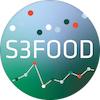Technology Training Set
Learn about the application of digital solutions in the food sector
The purpose of the S3FOOD Technology Training Set is to provide SMEs involved in the project with knowledge about the technological and digital opportunities for the food sector.
S3FOOD will provide this knowledge through:
1.face-to-face technology demonstration sessions, held during the project study-visits.
2.Videos of practical demonstrations of digital technologies in food facilities, living labs and real-life environments.
3.A repository of face-to-face and on-line training resources available in the S3FOOD Regions and Countries
How does the technology work in real life?
Take a look at our practical demonstrations video.
Artificial Vision
Strange objects debris detection
Digital twin
Digital twin and lab on chip
Photonic technologies
Hyperspectral technology and Online Photoprinting
3D printing
3D printing for manufacturing
3D printing: Ceramic material
3D printing: Titanium and aluminium
Augmented reality demonstrations
Augmented reality: Management of warehouses
Augmented reality: Guidance for technicians
Virtual reality demonstrations
Virtual reality
Virtual reality: The virtual twin
Blockchain demonstrations
Blockchain: Odometers in cars
Blockchain: Traceability in ciders
Other technology demonstrations
Advanced weight systems
Highly controlled cheese maturation
Energy efficiency system
Hyperspectral imaging
Infrared spectral imaging
Roll-to-roll manufacturing
Want to learn more?
Take a look at practical demonstrations from the S3FOOD partners
Humanising technology by Food & Bio Cluster Denmark and Bunker43
In this online webinar, the company Bunker43 will share specific technologies as sensor technology, software and IT solutions and how the technologies can create value in the food industry.
Blockchain by Food & Bio Cluster Denmark and IBM
This online webinar bring insights on how the Blockchain technology can be integrated in the food system. You will also be introduced to the IBM Food Trust platform where eg. Wallmarte, Unilever and Nestlé among others are using data from the whole value chain to build even stronger food safety and reduce cost.
